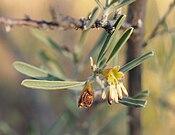Surianaceae
This article needs additional citations for verification. (May 2016) |
| Surianaceae | |
|---|---|

| |
| Cadellia pentastylis | |
| Scientific classification | |
| Kingdom: | Plantae |
| Clade: | Tracheophytes |
| Clade: | Angiosperms |
| Clade: | Eudicots |
| Clade: | Rosids |
| Order: | Fabales |
| Family: | Surianaceae Arn. |
| Type genus | |
| Suriana L. 1753
| |
| Genera | |
| |
| Synonyms | |
| |
The Surianaceae are a family of plants in the order Fabales with five genera and eight known species.[1] It has an unusual distribution: the genus Recchia is native to Mexico, and the sole member of Suriana, S. maritima, is a coastal plant with a pantropical distribution; and the remaining three genera are endemic to Australia.
They range in form from small shrubs to tall trees.
Systematics[]
Modern molecular phylogenetics suggest the following relationships:[2][3][4]
| |||||||||||||||||||||||||||||||
Species[]
| Image | Genus | Living Species |
|---|---|---|
| Recchia Moc. & Sessé ex DC.,1966 | ||
 |
Cadellia F.Muell., 1861 |
|
 |
Suriana L., 1753 |
|
| Guilfoylia F.Muell., 1873 |
| |
 |
Stylobasium Desf. 1819 |
References[]
- ^ Christenhusz, M. J. M. & Byng, J. W. (2016). "The number of known plants species in the world and its annual increase". Phytotaxa. 261 (3): 201–217. doi:10.11646/phytotaxa.261.3.1.
- ^ Forest F, Chase MW, Persson C, Crane PR, Hawkins JA (2007). "The role of biotic and abiotic factors in evolution of ant dispersal in the milkwort family (Polygalaceae)". Evolution. 61 (7): 1675–1694. doi:10.1111/j.1558-5646.2007.00138.x. PMID 17598748.
- ^ Crayn DM, Fernando ES, Gadek PA, Quinn CJ (1995). "A reassessment of the familial affinity of the Mexican genus Recchia Moçiño & Sessé ex DC". Brittonia. 47 (4): 397–402. doi:10.2307/2807568. JSTOR 2807568.
- ^ Bello MA, Bruneau A, Forest F, Hawkins JA (2009). "Elusive relationships within order Fabales: Phylogenetic analyses using matK and rbcL sequence data". Syst Bot. 34 (1): 102–114. doi:10.1600/036364409787602348.
Categories:
- Surianaceae
- Rosid families
- Rosid stubs